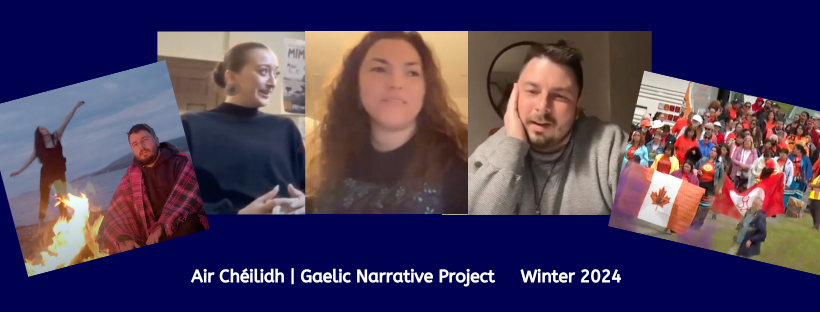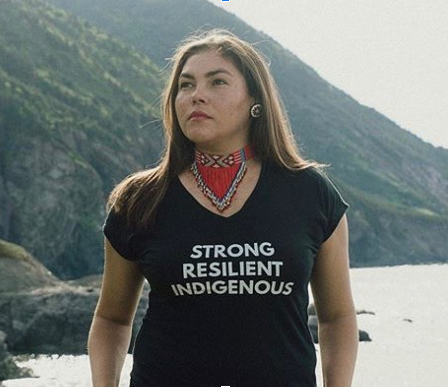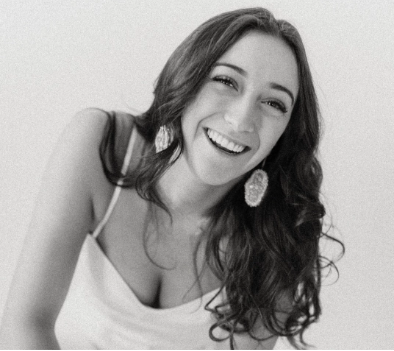Creative Spirit: Mi’kmaw–Gaelic Relations & Storytelling
February 23, 2024
Host: Bradley Murphy
Guests: Sarah Prosper and Tara Lewis
Cha'n fhiach cuirm gun a còmhradh | A feast is worth nothing without its conversation.
We gathered at the feasting table with host Bradley Murphy and his two guests, Tara Lewis and Sarah Prosper, both Mi’kmaw women from Eskasoni First Nation, to explore the Creative Spirit. The three spoke of the practices that help to ground them in place and tradition, bringing them into right-relationship with the land and their communities, and how this rootedness empowers their actions, their activism and their creative work.
Tara Lewis is from Eskasoni First Nation in Unama’ki, also known as Cape Breton Island. She is a proud Mi’kmaw woman who, like all L'nu, had to confront and endure many indignities from colonial mindsets. Embracing her (Mi’kmaw) culture, language, medicines, rights, and traditions allowed Tara to raise seven intelligent, respectful, and independent children. She is a hiking ambassador in Unama'ki, promoting her beautiful island through social media. Travelling and meeting various people from across the world has opened Tara's eyes, heart, and soul towards demonstrating the importance of protecting treaty rights in Mi’kma’ki.
Sarah Prosper is a dancer, choreographer, recreation therapist, storyteller, activist and adventurer. As a young artist in the community, Sarah links many individuals and groups into deeper connection with movement and healing. Her passion for the arts is multidisciplinary—from curating music and singing to directing large productions. Her practice deepens respect and reciprocity through dance, movement, Indigenous wellness, social sciences, social justice, mental health and the land.
Raised in Eskasoni First Nation, she is winner of the 2022 Nova Scotia Indigenous Artist Recognition Award and creative director of the award-winning production Samqwan ("Water"). Currently, she is working on a new theatrical project, Mimikej ("Butterfly"), which takes a deeper look into the Centralization of the Mi'kmaq in Mi'kma'ki. Inspired by the lives of real people who were moved from these lands, Mimikej is a journey of recollection.
What we heard
Visiting fills your cup
Bradley and Tara spoke in a live conversation, with Bradley introducing Tara as both a best friend and a teacher: “I’ve gotten to know this area where we liveーMi’kma’kiーso much better because of your experience and your teachings.”
The two spoke of the importance of visitingーa cultural practice embraced in Gaelic and Mi’kmaw communities alikeーand how much a person can learn from these céilidhs. Tara was “never home” as a kid, always off visiting neighbours or in the woods. Even now, the mother of seven children herself, she makes time to have coffee with her parents every morning. She spoke of how visiting fills her literal and proverbial cup: “getting out and making connections is a way to fill that cup!”
Tara and Bradley acknowledged the busy lives we lead today and how we feel we don’t have time to make those important visits, but how often do we then sit at home scrolling “social” media instead of going out for a visit? Tara spoke of the benefits of social media (she uses it frequently to connect with her community, organize events and share beautiful photos from her many hikes around Cape Breton) but also the need to balance it with action. She travels all over the Maritimes and down to Maine visiting and attending events, following a deep instinctual guidance of where she needs to be:
“I have this inner calling…I just have a feeling, and when I feel like I have to be somewhere I just go, without even thinking. People ask, ‘How do you do it? Like, you’re a mom and everything.’ And for me, luckily, everything always works out. I never worry about things…I just go on that intuition of going places and, you know, it just follows through and works out, funny as that sounds!
“I never know what is the purpose for me to go there, but once I’m there it comes together why I need to be there. Being a Mi’kmaw woman…having that connection to the land, I think sometimes too that land also calls me, even if I’m aware or not, and then when I’m there in that territory it becomes apparent why I’m there.”
The land connection, linking back to Màiri and Ceit’s conversation in the third visit, was a thread that ran through this evening as well. Tara spoke of how, as a child, she would visit plants and animals the same way she visited her neighbours. She still feels the importance of visiting Mother Earth. She hikes regularly year-round: “the longer I hike the more connected I feelーthat I’m with her.”
Freedom Day march
For Tara, walking is both a way of connecting to the Earth and a way of honouring her ancestors and bearing witness to the indignities inflicted upon her people through institutional programs such as Residential Schools.
The Residential School for the Maritimes was in Shubenacadie, Nova Scotia, and during its years of operation between 1930 and 1967 it housed First Nations children in extremely poor and often abusive conditions. Every year, on June 21st (now Aboriginal Day), the children would be released back to their communities for the summer. They would walk the kilometre from the school to the train station to go home and referred to the day as “Freedom Day.”
Four years ago, Tara’s father—himself a Residential School Survivor—told her he had had a dream of a march commemorating the walk that he and so many other children had made between the school and the station. Tara posted an account of her father’s vision on Facebook and received so much encouragement from her community that, with the help of the Grassroots Grandmother’s, she organized an event and turned the dream into reality. This year will be the fourth Freedom Day March “to honour those children who never came home [and] the survivors.” The event is open to all and Tara encouraged anyone interested in attending this summer to follow Mawikuti’k - Growing Together on Facebook for updates.
Holding the thread
In the second part of the evening we watched a pre-recorded conversation between Bradley and his second guest, dancer, choreographer and recreational therapist Sarah Prosper. An extended version of that interview is available to watch here, and their collaborative video, Ailein Duinn, will be available to watch on YouTube mid-March. Bradley and Sarah explored the creative process, two-eyed seeing and living at the balance point between traditional and contemporary ways of being.
Sarah spoke of how “what you uphold and what is remembered is really important” and also acknowledged that “traditional ways of knowing are being built right now.”
“Traditional and contemporary ways of knowing can be mixed because they have to be. You can’t exist without tradition and you can’t go forward and make new things without contemporary ways of knowing. I try not to feel like there’s one answer, because there isn’t.”
This conversation echoed many of the themes that Bradley and Tara’s touched on. Sarah emphasized the importance of visiting with Nature and spoke of how she included certain plants and animals among the beings she looks up to, alongside many of her immersion school teachers who were also Residential School survivors. As a child she, like Tara, was often in nature, fascinated by trees and quicksand and loving to be in water. She spoke of how certain special objects hold great meaning for her as well: “If I’m playing Waltes on an eighty-year-old Waltes board and dice I’m not just playing the game, I’m thinking about the hands that carved it…I look up to things like that.”
The creative spirit
Much like Tara following her intuition to guide her to places and people she needs to visit, Sarah emphasized the importance of following your intuition when receiving the creative spirit. As a dancer, she uses movement to channel things that cannot be set down in language: “You won’t know in words what any of that means.”
Her productions, SAMQUAN (Water) and MIMIKEJ (Butterfly) explore the themes of water inequality and centralization through dance and movement theatre. According to the Council of Canadians, there are still 28 long-term water advisories on reserves in Canada. Sarah wanted SAMQUAN to respond to a question she feels is often levelled at First Nations people: “Why don’t you just move?” With MIMIKEJ (premiering at Highland Arts Theatre March 5-10), she is taking this further in an exploration of the history of Centralization in Canada—how indigenous people came to live on reserves and experience these inequalities in the first place. Before this dislocation, she points out, “we lived everywhere.”
Sarah is a careful crafter of her work and the stories that she shares, respectful of which narratives should remain privately within families and communities and which can be shared with courage and dignity to foster greater understanding and healing:
“Not everything needs to be shared, some things aren’t meant to be public information. But that we are able to express ourselves today is important…we can’t hide or feel like we need to…shield our spirit to everyone else because we’re afraid something will happen…. We have people and supporters all around us to witness and say, ‘That happened and I hope going forward that this happens.’”
What we said
After listening to the conversation, discussing what we’d heard in the breakout rooms, and then returning to the main room, we shared our reflections in the chat. Below is a sample of our comments. Read the full transcript here, along with more resources and links.
My great grandfather and his parents spoke both Gaidhlig & Mi'kmaw...in fact, his parents only spoke those two languages - no English.
I don’t visit Mother Nature enough. I’m overdue for some quality time with her.
Thanks for the ideas presented. It is good to hear what others think and to keep going on our personal and community journey with new energy
I can so relate to Tara's love and the importance she places on visiting. I was raised in that same culture in my home community in Cape Breton as well. I hope I have instilled the importance of visiting in my own children.
This is so touching - what a beautiful video, and what a beautiful song. Tapadh leibh! See you next time!



